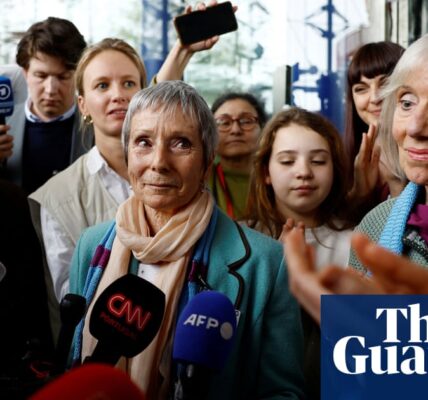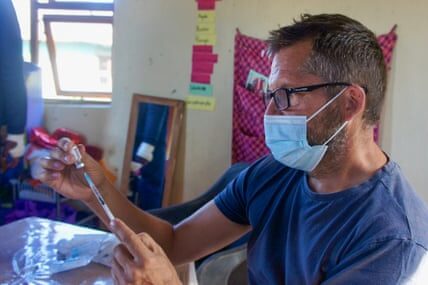‘The only limit is our imagination’: Tim Peake on what living in space taught him about life on Earth
The astronaut Tim Peake is tracking his cab driver on his phone. The car that will deliver him from our meeting to his next appointment (on a day packed with radio commitments) is late and Peake is calculating the most time-efficient route for us to meander through Soho’s traffic, on foot, to reach it. Peake is the seventh UK-born astronaut in space and the first Briton to spacewalk – an unfathomable feat for us, but not for him. Space, he agrees, casting a glance at a printout of the schedule he keeps in his jacket pocket, might be easier to navigate than rush hour on Earth.
We have already been chatting for an hour, in a snug above his agent’s office. He announced his retirement as a European Space Agency (ESA) astronaut in January 2023, but we’re meeting in the wake of news that he is preparing for a return to orbit on the first ever all-British space mission. That mission is due to launch next year and Peake is expected to be announced as the flight’s commander within the coming weeks. The radio interviews he’s conducting today coincide with a deadline for British businesses to make a case for their science to be included onboard, to be tested in microgravity as a priority for the mission: a strident bid to showcase Britain’s Stem capabilities on an outer-world stage.
“Is going into space a bit like being a boxer,” I ask. “You’ll always be tempted back into the ring one final time?”
Peake smiles and laughs. “I think it is,” he says.
Since blasting off into space in December 2015, for the ESA’s six-month Principia mission, Peake has become a polished and very public brand. Through Principia, he raised the bar for international space engagement: news of his mission, which involved countless experiments conducted onboard the International Space Station (ISS), reached 33 million people, many of them children. Retirement had been a difficult decision. “The logic was both personal and professional,” he says. Peake met his wife, Rebecca, while both were serving in the army, and the couple have two sons, Oliver (15) and Thomas (12).
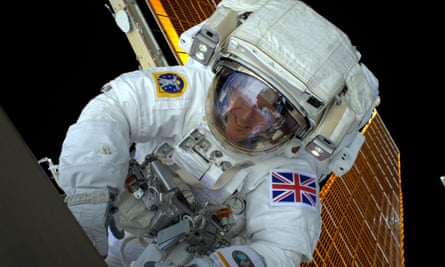
“We’d been bouncing between Germany and Houston,” Peake says. Retirement “gave the kids some stability, got them settled. Also, working for the ESA as a government official, your hands are tied. Following the Principia mission there was so much opportunity: to work in the UK space sector, to join the advisory board of startup companies, to expand my knowledge of how business works as well as to be able to say, ‘OK, I can write a book now and go on tour.’ And I knew what was coming up in terms of commercial space flight. I knew opportunities were only going to grow exponentially over the next five to 10 years. Just because I was leaving the ESA, I wasn’t hanging up the boots.” He adds, “The moment you really retire is the moment they stop asking you to come.”
Before his ESA retirement, Peake, now 52, had taken on an ambassadorial role that focused on educational outreach. His upcoming mission will include four UK Space Agency astronauts, one of whom, Peake says, is likely to be the former Paralympian John McFall, who would become the first para-astronaut in space. The mission will last two or three weeks, and will be paid for by privately funded US firm Axiom Space. “The opportunity to command a mission is hugely exciting,” he says. “Just getting into space again, the whole package… As somebody who learned to fly and then taught people to fly, to take three Britons up who haven’t flown before would be fantastic.”
Peake describes the next decade of space exploration as “the most adventurous and exciting” yet. He believes the universe is “teeming with life”. And he has ambitions to fly to Mars, 4m kilometres away. I ask if he’d really attempt that trip. “I’d give it some serious consideration,” he says. “Right now, it would be a selfish thing to do, when the boys are about to go through their exam years, their teenage years, and might want their dad around. I think I could do it when they’re a bit older.”
There are “no technological hurdles to overcome”, he says, of reaching the red planet. “And setting up a habitat on Mars would be incredible. I was thinking about it the other day. I can’t see us being ready in 10 years, 15 at the earliest. And I thought that would be beyond my career timeframe. Then I found out Don Pettit, a Nasa astronaut who’s going up to the space station on a six-month mission, is 69!”
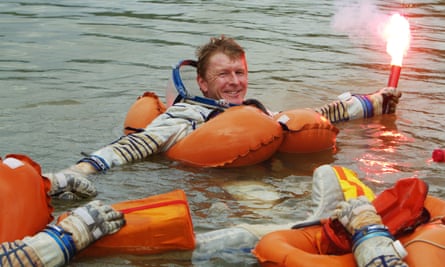
Principia and the preceding training necessitated him missing half of his sons’ lives, which has preyed on his mind. “You do get homesick. Not to an extent where it’s problematic, but there’s a chunk of life down there that you’re missing out on: birthdays, anniversaries, Christmases. You’re very remote and detached and your family has to get on and enjoy these things. We look back at photo albums now and I think, ‘Where was I?’”
His family has become accustomed to the risk that comes with space missions, but it’s something he grapples with. “It would be devastating to lose a parent in your teenage years,” he says. “There is risk involved. But there’s risk in life, and you’ve got to grasp the opportunities.”
Peake’s life began with an “ordinary” childhood – an achievement of his parents, he says – in Chichester, West Sussex. He was eight months old when Apollo 17 landed on the moon, in 1972, and 19 when Helen Sharman became the first Brit in space, in 1991. He has described himself as an “incorrigible pusher of buttons and switcher of switches”, but there were no early fantasies of reaching space beyond him owning a Lego rocket. When he watched a Blue Peter segment on air stunts, aged nine, he developed a fascination with helicopters. A gliding trip he took when he was a teen Army cadet cemented his love of flight.
He was an “unexceptional” student. He obtained C, D and E grades in A-level physics, maths and chemistry. “I should have done better,” he says. “I probably took my eye off the ball because I’d already been given a place at Sandhurst. But I’ve worked extremely hard ever since. I’ve never stopped studying and I’ve always had a textbook by my bed.” He graduated from Sandhurst into a career as a military pilot. Peake was 36 with 3,000 Apache hours and postings in Northern Ireland and Afghanistan under his belt when Rebecca spotted an ad for an astronaut job at the ESA that was open to Britons. He answered it – highlighting his quiet confidence, meticulous attention to detail and sharp analytical mind, and saw off 8,000 candidates during a year-long recruitment process. Peake was unveiled to the media in Paris in 2009. In 2012, the British government announced it would, for the first time, involve itself in human spaceflight, having outlined a 20-year programme to accelerate its position as a leader in the global space economy. A year later, at another press conference, this time at London’s Science Museum, Peake was announced as a crew member for a long-duration mission to the ISS – the Principia mission. He returned to Earth in June 2016 having accomplished all sorts of newsworthy space endeavours, including running the equivalent of the London marathon, presenting a Brit award and completing a five-hour spacewalk.
When I ask for the defining image of the mission, he recalls peering out of the ISS hatch and watching a colleague in space. “That’s just amazing, to see another human outside. It’s one thing to look down at Earth and you kind of get used to that, but when somebody does a spacewalk, seeing a human with the Earth in the background… That’s not Photoshopped, it’s real!” He also remembers the aurora’s glow, which he describes as “probably one of the nicest memories to go back to. It’s magical. It’s a beautiful, beautiful sight.” Space has a smell, too: “A bit like static electricity or burnt metal when you take your jumper off, that Ozone-y smell. I’ve never smelt it anywhere else.”
“Has he missed all this,” I ask him – the sights and the smells and exercising his space reflexes, during retirement?
“Yes, absolutely. Part of me really looks forward to going back because my life at the moment is just spinning a number of different plates.”
Peake’s retirement, according to his Instagram account, has included everything from visiting Wimbledon’s royal box to dry stone walling, part of a two-year DIY project at the West Sussex home he and Rebecca bought after lockdown. He starts a live UK tour in September. Six months of intensive astronaut training, in the USA, Europe and Japan, likely beckons after that.
For Principia, Peake amassed six years of training that included stints surviving underwater and in caves. “A lot of astronaut training is there for life, but there will be an element of refresher training. What’s the latest emergency equipment? What’s the science we’re doing? The biggest thing for me to learn about would be the brand new space craft. It’s a bit like drinking through a hose pipe, in terms of taking in all the information.”
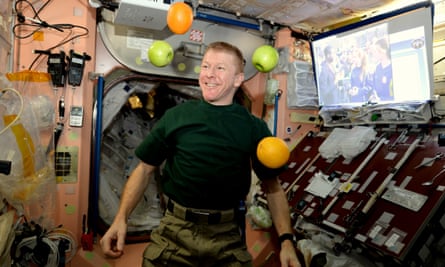
It is space travel’s capacity for scientific advancement that Peake is most excited about. He compares his astronaut role to that of a lab technician. “Maybe you do 10 experiments in a day,” he says. That’s the real value of space’s commercial era, to his mind: experimenting in space to help people on Earth.
after newsletter promotion
Microgravity is a sought-after testing ground for science and tech, removing factors that disrupt chemical processes on Earth. As such, science is a surprising mainstay of the 21st-century space race. Peake was involved in more than 250 experiments during his last time in space, including experiments he conducted on himself: monitoring his body’s reaction to weightlessness, for example, by taking his own blood samples and sending them back down to Earth to be analysed. X-rays and bone-density scans are also par for the course, expanding our understanding of the body’s reaction to forces other than gravity; so, too, learning how plants – and therefore food and other life forms – grow in space.
This scientific work, Peake says, offers the mission’s “real satisfaction.” And the diminishing cost of transporting space cargo creates the potential for shipping clean, limitless solar energy back down to Earth. “I don’t even think the space industry itself has fully woken up to what that means for what you can do in space. If you can get so much material into orbit so cheaply, you can build factories up there, we can print human organs using bio ink. We are maybe 10 years off. It’s gamechanging in terms of the economics. The only limit is our imagination.”
Technology, specifically AI, will be a research priority for the British mission. “If you really want to have AI farms, then have them in space. You’ve got access to 24 hours a day solar energy and the best heat rejection you could want.”
Peake has described the space game as geo-political “horse trading”. But he’s clearly bought into the potential of space being a new and profitable business arena. What then of tech billionaires and celebrities: do they have the same business being in space as professional astronauts?
“Generally, I detach myself from the private space-flight activities,” he says. “I’d prefer space to be used for scientific research, inspiration and exploration. Take this UK mission: if it was just a case of national chest-beating, not interested. It’s got to be a worthwhile endeavour. It’s got to have a beneficial impact for the future.”
Boosting Britain’s science profile is part of that. “I think the UK has been through the wringer in the last few years. Brexit hasn’t helped our scientific community. I think this mission could be amazing in terms of showcasing some of the great stuff we do.” Education is also a huge driver. “We reached 2m school kids with the last mission. With four Britons we can have a massive impact. It’s hard to overestimate the knock-on effect.”
Has he considered the line that exploration treads between selfishness and altruism? “I think it’s a mix. Most of my colleagues feel as if we’re contributing something to the greater good. That’s certainly why I joined the Space Agency. But I’d say every astronaut has a selfish reason, too. You’d never put yourself through the training, or put your family through it, unless you were passionate.”
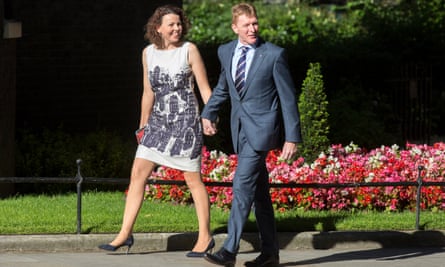
He believes all world leaders would benefit from experiencing the combined vulnerability, hostility and beauty of space, if only to look down and see what’s at stake. “I appreciate the complexities of geopolitics down here, but I think when you spend six months on the spacecraft with five other people from nations around the world and you’re all looking down at planet Earth and seeing it as a common home, it makes clear that you’re all working together; everybody’s life depends upon each other’s and on the thousands of people who are working together down on Earth to keep you up there.
“When you see dust storms coming off the Sahara spreading over southern Europe, wildfires in Canada spreading over North America, when you see how little room there is in our atmosphere, how what happens in China or India or the Amazon rainforest is affecting northern Europe and how what we do is going to affect the rest of the planet, it gives you an appreciation that you might feel we have borders on Earth, but there aren’t really any…”
During Principia, he orbited Earth 2,720 times; night came and went 16 times every 24 hours. He recalls seeing smog encase the Kathmandu Valley, a place he’d visited at 19, and crystal clear Tibetan plains to the north: “You see the juxtaposition and you think: ‘That’s us. We did that!’” When he was last in space, it was nature on Earth that he missed most, other than family. “It’s all sterile and clinical on the ISS. There’s one sorry poster in the Russian dining room of a green field with a tree in it. We all end up, on a Friday night, having dinner, staring at it. Humans need to be around nature.”
Peake is juggling his many commitments from the back of the cab we’re in, messaging Rebecca about childcare while on his way to his final interview. There is a concern that visiting space a second time could “take the shine off” having already spent six months in orbit. “I had a huge amount of time up there appreciating that,” he says. But for Peake, a return in the commander’s seat seems only right – a British mission might never have happened if his last mission hadn’t had the impact it did. “I’m quite a modest person; I don’t like to come across as arrogant. On a practical level it set the benchmark of what you can do with a mission. France had flown several astronauts before, so had Italy, so had Germany, suddenly here come the Brits.”
He’d like to imagine this outreach and his enthusiasm for science to be his legacy. But there are bigger issues, too. “As exciting as the next 10 years will be, with that comes risk: that we manage it, we’re sustainable, we’re responsible, that tourism doesn’t get out of control, space doesn’t become a domain that is militarised, that we operate peacefully. At the moment, space is still relatively pristine. Nobody owns it. We can all use it, we tend to look after it and we tend to get on well together. We’re in this era where we need to make sure that continues. If we don’t look after it, we won’t have it.”
Tim Peake’s Astronauts: The Quest To Explore Space is touring the UK from 1 September to 4 October. Tickets from fane.co.uk/tim-peake
Source: theguardian.com
